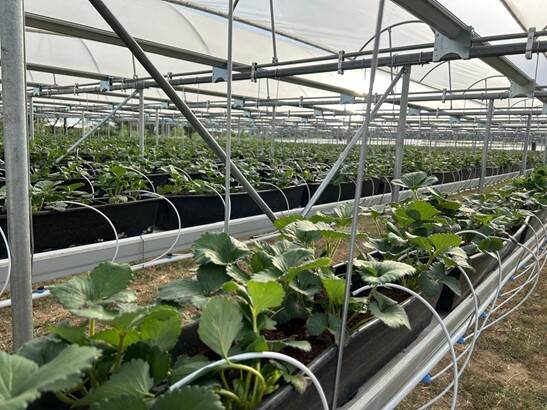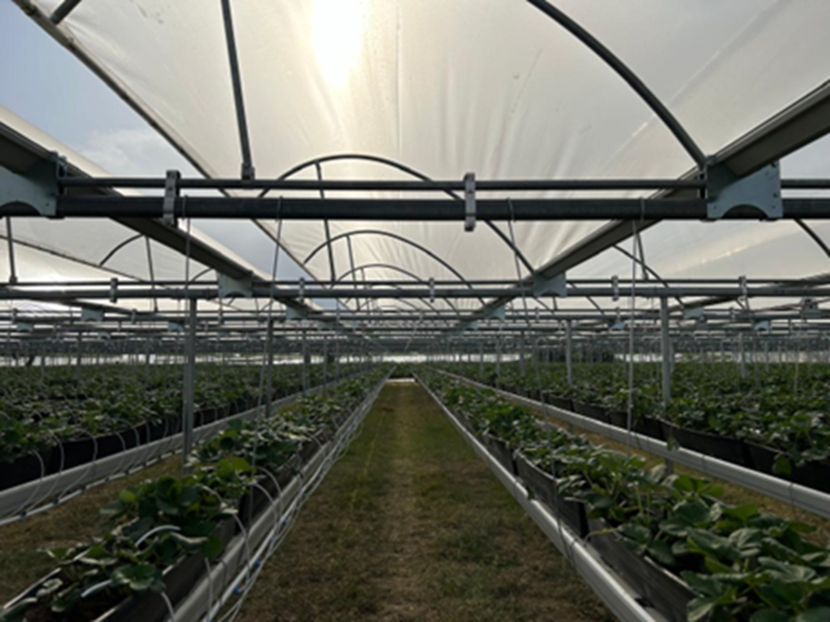Advancing Ethiopia's soft fruit industry by introducing Dutch innovation
The first technologically advanced gutter system for soft fruit production has been introduced in Koka, Ethiopia, with the supports of the Demonstration Project (DHI) instrument of the Netherlands Enterprise Agency (RVO). This initiative, completed last week, was executed in partnership with Zuqualla Horti PLC, FlevoPlants, Meteor Systems, and Resilience.

The project includes the installation of Meteor Systems' innovative gutter system on the farm of Zuqualla Horti PLC in Koka, Ethiopia's leading strawberry producer. Zuqualla, which currently operates 20 hectares of strawberry fields and 8 hectares of greenhouse cuttings. The farm has been cultivating strawberries in soil since 2005. However, under new ownership since 2020, it has sought to enhance productivity and environmental sustainability by adopting the gutter system.
Zuqualla's transition to the gutter system includes the introduction of two new strawberry varieties from FlevoPlants, aiming to demonstrate these advancements to local stakeholders. Resilience coordinated the project, which involves significant contributions from three companies within the soft fruit sector.
Objectives and Benefits of the program
The project intends to promote Dutch production systems and varieties within the Ethiopian market, aiming to boost profitability and sustainability. By leveraging Dutch subsidies from RVO and through the contribution of the companies involved, the project plans to conduct demonstrations and training sessions to showcase to the Ethiopian growers the technologies utilized.
A Dutch soft fruit demonstration farm has been established on a 0.25-hectare raised gutter system from Meteor Systems. This farm showcases new strawberry varieties and advanced production practices designed to maximize productivity while minimizing pesticide and fertilizer use.
- Social Impact: The project aims to train at least 200 Ethiopian soft fruit farmers on improved production techniques. Additionally, the raised gutter system improves labor conditions by allowing workers to stand upright during plant care and harvesting.
- Environmental Benefits: The new system is more environmentally friendly, reducing pesticide usage through integrated pest management and hydroponic techniques. It also boasts higher fertilizer efficiency via water and nutrient recirculation. These practices align with Dutch goals for a circular economy and sustainable agriculture.
- Financial Advantages: The adoption of advanced systems and new varieties is anticipated to lower costs and increase productivity per square meter, thereby enhancing the competitiveness of Ethiopia's soft fruit sector. This could lead to increased exports, particularly to the Middle East and potentially the EU, addressing Ethiopia's foreign exchange deficit by boosting export revenues.

The origin of the DHI initiative on soft fruits
This initiative originates from a 2021 study commissioned by the Agricultural Department of the Netherlands Embassy in Addis Ababa, which aimed to evaluate the plant propagation material sector in Ethiopia. The research sought to align the needs of Ethiopian public and private sectors with Dutch expertise and investment in the propagation sector. Given the booming global demand for soft fruits like strawberries, raspberries, and blueberries, combined with Ethiopia's favorable production conditions, the study identified significant potential for developing the soft fruit sub-sector.
The study highlighted Ethiopia's growing strawberry production and exports, which currently depend on planting material from Israel, emphasizing the necessity for technological and varietal advancements. It recommended exploring collaborations between Dutch and Ethiopian companies to introduce new varieties, technology, and crop management practices. This input paved the way for incorporating Dutch innovations in Ethiopian strawberry production, with high gutter systems identified as a transformative advancement for soft fruit cultivation. This recommendation ultimately inspired the conception of the DHI project, aimed at implementing these innovative solutions.